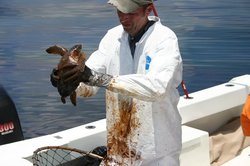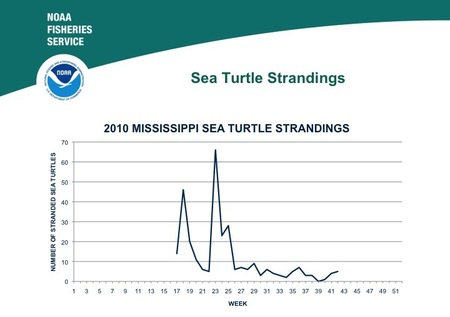Feds' own data raise questions about effort to blame Gulf fishermen for sea turtle death spike
 There was an outpouring of anger from fishermen at a public meeting held in Mississippi last week to discuss federal plans for addressing a dramatic increase in deaths of endangered sea turtles. The government is considering requiring all shrimpers with skimmer boats to use turtle-excluder devices (TEDs) in their nets -- a fix some smaller operations say they can't afford.
There was an outpouring of anger from fishermen at a public meeting held in Mississippi last week to discuss federal plans for addressing a dramatic increase in deaths of endangered sea turtles. The government is considering requiring all shrimpers with skimmer boats to use turtle-excluder devices (TEDs) in their nets -- a fix some smaller operations say they can't afford.The National Oceanic and Atmospheric Administration reports that about 600 turtles washed up dead on Gulf Coast beaches last year and another 400 so far this year -- an alarmingly high number compared to the usual 100 or so strandings per year. NOAA, a division of the Department of Commerce, says those numbers show the need for TEDs built into all shrimp nets to allow trapped turtles to escape.
Regulations under the Endangered Species Act -- a law that covers all six sea turtle species found in the U.S. -- require most shrimp trawlers to have properly installed TEDs in their nets when fishing in both onshore and inshore Gulf waters. Since mid-April, NOAA reports that its personnel have boarded hundreds of boats and issued 46 warnings of noncompliance, with another 25 cases forwarded to agency attorneys for review.
But the push for TEDs in smaller skimmers has sparked anger among Gulf fishers, who say they are being wrongly blamed for the spike in turtle deaths. "The current hammering of fishing families across the Gulf of Mexico, by NOAA and a number of NGOs, constitutes an environmental and human injustice," says Louisiana Bayoukeeper Tracy Kuhns, whose husband is a commercial fisherman.
Kuhns and other Gulf fishers say there's a more likely suspect for the turtle deaths: BP's Gulf oil spill.
For years before the 2010 BP oil spill disaster in the Gulf of Mexico, shrimpers were found to be 97 percent compliant with TED regulations, Kuhns points out. Then suddenly, as the oil began spilling from the company's Macondo well, sea turtle deaths -- as well as deaths of other marine life -- began increasing dramatically. A researcher at the University of Central Florida has reported that the oil and chemical dispersants used on the spill may have contributed to an unusual number of dolphin deaths by disrupting the food chain.
The government's own data show the correlation between the oil disaster and sea turtle deaths. NOAA shared the following chart at last week's meeting in Mississippi (click on chart for a larger image):
 As the chart illustrates, the first big spike in sea turtle deaths in Mississippi came around the 18th week of 2010. That would have been the first week of May -- two weeks after BP's Deepwater Horizon rig exploded in the Gulf. The second big spike came around week 24 or mid-June, when the well was still gushing uncontrolled. During this time, vast areas of the Gulf were closed to fishing due to the spill, with shrimp trawlers idled across the region.
As the chart illustrates, the first big spike in sea turtle deaths in Mississippi came around the 18th week of 2010. That would have been the first week of May -- two weeks after BP's Deepwater Horizon rig exploded in the Gulf. The second big spike came around week 24 or mid-June, when the well was still gushing uncontrolled. During this time, vast areas of the Gulf were closed to fishing due to the spill, with shrimp trawlers idled across the region.But last October, despite the evidence that the spill was impacting marine life, NOAA stopped handling stranded sea turtles under its oil spill response program and instead shifted responsibility back to their pre-existing Sea Turtle Stranding and Salvage Network. From Oct. 20, 2010 onward, only visibly oiled animals were tallied as casualties of the BP disaster -- a move that Kuhns says was a mistake.
"This ongoing policy of making natural resource and safety decisions based on the presence or lack of visible oil totally disregards known toxicological science," she says. "It enables NOAA and others to relieve BP of a large part of its natural resource damage recovery responsibilities to the citizens of the United States of America."
NOAA's push to expand TED requirements comes at the same time fishermen are facing higher fuel costs and lower prices for their catch. In addition to expanding TED requirements, the agency is also considering closing waters to shrimp trawlers during specific times still to be determined.
"This is just another burden to put on top of the fishermen and shrimpers," says Mickey Sou of Asian Americans for Change, a Mississippi-based group that works with Vietnamese-American fishermen.
(In the NOAA photo above, NOAA veterinarian Dr. Brian Stacy cleans a young Kemp's ridley turtle that's been oiled.)
Tags
Sue Sturgis
Sue is the former editorial director of Facing South and the Institute for Southern Studies.
